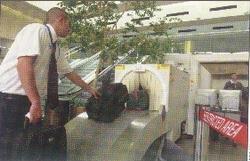TSA Could Widen Privatization Next Year
 Look up there at the
front of the line leading to the passenger concourse. Who are those
people running the bag scanner, telling us to take our shoes off
and generally putting their hands where even our spouses won't go
without asking permission. Are they federal workers, or are they
private security types?
Look up there at the
front of the line leading to the passenger concourse. Who are those
people running the bag scanner, telling us to take our shoes off
and generally putting their hands where even our spouses won't go
without asking permission. Are they federal workers, or are they
private security types?
Are you sure?
Congress Daily reports private companies -- derided on
Capitol Hill and generally across the country since the 9-11
attacks -- are back in business at five airports around the
country. Under a new TSA pilot program, most of the companies
involved in the effort hope to renew their contract this November
for another 12 months. "We've put everything we have to show
we can do this," said Robert Coe, president and chief executive
officer of Covenant Aviation Security, which is providing screening
at San Francisco International (CA) and Tupelo (MS) airports. The
company says it's drawn on its experience with securing Energy
Department facilities, experience which provides "the best model of
strong government oversight and guidance," Coe said.
The pilot program has gone well for ITS (which becomes FirstLine
Transportation Security next weekend) there have been "some bumps
along the way" in getting the new program in place on a tight
timeline "with no road map," said John DeMell, the company's
president. But, he said, the partnership continues to work through
the issues and the company is interested in future work at other
airports.
The TSA Believes.
 The TSA is "confident
that the private companies are providing the appropriate level of
security," said spokesman Brian Turmail. Not only is the TSA
conducting aggressive undercover inspections that regularly try to
spoof security checkers, the agency is conducting a comprehensive
review of the program, he said. Results of those tests will not be
made public.
The TSA is "confident
that the private companies are providing the appropriate level of
security," said spokesman Brian Turmail. Not only is the TSA
conducting aggressive undercover inspections that regularly try to
spoof security checkers, the agency is conducting a comprehensive
review of the program, he said. Results of those tests will not be
made public.
Congressman John Mica (R-FL), "The key difference is that
before September 11, airlines were in charge of security—and
they had a vested interest in cutting corners," said a Mica
spokesman. [Not to mention an interest in making their own airline
safer than everyone else's, within the federal guidelines, which
were not -- repeat, not -- breached on September
11 --ed.] Screeners were under-trained, under-paid and
overworked, and standards varied depending on the airport, he
added.
Mica has asked the Homeland Security Department's inspector
general to do an independent assessment of the Transportation
Security Administration's federal screening process. And he has
also requested that GAO review the airport baggage screening before
and after the September 11, 2001, terrorist attacks.
But not everyone is satisfied that a return to private screeners
will be any better for passenger security in the long run. The
American Federation of Government Employees has "grave concerns"
[not to mention their own vested interest --ed.] about the idea,
said union spokeswoman Diane Witiak. If screening is contracted
out, Witiak said it resurrects some of the same problems that
existed before federal screeners were installed at the nation's
airports. "Airport security should be handled by the federal
government, not for profit at the expense of the flying public,"
she said. She did not elaborate on how the federal employees were
getting paid.
 NTSB Final Report: Rutan Long-EZ
NTSB Final Report: Rutan Long-EZ ANN FAQ: Turn On Post Notifications
ANN FAQ: Turn On Post Notifications Classic Aero-TV: ICAS Perspectives - Advice for New Air Show Performers
Classic Aero-TV: ICAS Perspectives - Advice for New Air Show Performers ANN's Daily Aero-Linx (06.28.25)
ANN's Daily Aero-Linx (06.28.25) Aero-News: Quote of the Day (06.28.25)
Aero-News: Quote of the Day (06.28.25)




